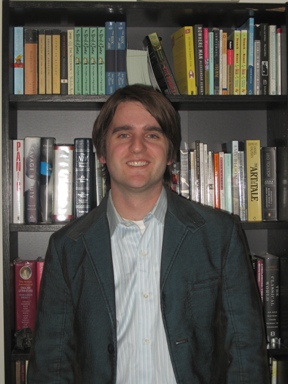One minor (major) detail: Nathan Bransford transitioned out of agenting in 2010, after this interview first ran.
[That said, in 2020, this interview is still relevant.]
The former literary agent speaks openly about authenticity in platform building, when and why he takes on a client and what’s at stake from his side of the desk.
NATHAN BRANSFORD is a literary agent with Curtis Brown Ltd., an agency that has been representing authors since 1914. Born and raised in Colusa, California, he graduated from Stanford University with a degree in English. Nathan is also the author of JACOB WONDERBAR AND THE COSMIC SPACE KAPOW, which will be published by Dial Books for Young Readers in 2011.
Meredith: Translate your gut feeling about a “perfect” client into simple, ordinary language. How do you know when a creative partnership is going to fly?
NATHAN: I usually know when I’m going to take on a project  when I have absolutely no doubt or questions in my mind about a book’s potential. A lot of times I think agents and editors try to talk themselves into a project – we think, “Oh, well, this book isn’t perfect, but it has a lot going for it… maybe someone else will see what’s great about it….” But if you have to talk yourself into a project it’s probably not going to work. When a project comes along that you can sell (or at least come very close to selling – this is a tough market even for the best projects) you just know.
when I have absolutely no doubt or questions in my mind about a book’s potential. A lot of times I think agents and editors try to talk themselves into a project – we think, “Oh, well, this book isn’t perfect, but it has a lot going for it… maybe someone else will see what’s great about it….” But if you have to talk yourself into a project it’s probably not going to work. When a project comes along that you can sell (or at least come very close to selling – this is a tough market even for the best projects) you just know.
Meredith: Platform used to really confuse (and intimidate) me. I’ve begun to view platform as a series of interconnected relationships that mutually serve the parties involved—so as a writer (me) it’s about building relationships I care about. Tell us about an agent’s view of platform—more specifically, your view.
NATHAN: My view is your view. I think that’s a great definition, and I think it gets at the extent to which platform isn’t about superficial relationships or basic name recognition but rather a real connection built between an author and their audience. Basically platform is the number of eyeballs you can summon at any given time, and with so many distractions competing for our attention, only a strong connection/affinity will motivate someone to go out of their way to buy a book.
Meredith: It seems appropriate to ask: has platform become an overused/abused term? What’s your take? Can you reframe it?
NATHAN: Sadly no, particularly when the traditional selling tools at publishers’ disposal (such as front bookstore placement, reviews, marketing, etc.) are waning in effectiveness, there’s even more of a premium for the authors who are able to deliver an audience. We’re in an era where platform is hugely important. This used to be mainly something that people looked for in nonfiction, but you’re seeing editors want this from novelists more and more as well.
Meredith: Is rejection an issue for agents—personally? How do you view rejection from publishers? What greater purpose does it serve in the creative process—for the writer and for the agent?
NATHAN: Definitely – I’ve gone through the submission process as both an agent and an author, and quite honestly I find it equally difficult in both cases. As an author, the work being rejected is your work and that’s obviously hard for any writer. But as an agent, there’s a huge amount at stake as well – the author is depending on you (by far the most important element), agents really need to keep selling even in a tough market, and it takes an incredible amount of time to ready a project for submission (and agents don’t earn commission if the book doesn’t sell), so there’s a lot riding on it.
At the same time, I definitely think rejection can serve the creative process and I believe rejection can often be for the best. JACOB WONDERBAR was not the first novel I wrote, but I’m now thankful my first novel didn’t work out. It wasn’t good enough, and in retrospect I now see that I needed to have that experience and learned a great deal from it. And frankly, I’m glad it didn’t ultimately see publication, though of course at the time it was difficult to put it in the drawer.
Meredith: When you take on a client, does your mind wonder first what you would like, or what editors would? Do you think about pleasing the editorial crowd, the marketing crew, the author—or yourself? Along those lines, what’s more crucial, the right author or the right manuscript?
NATHAN: By the time I’ve finished reading a project I’m going to take on I know I love it and already have a mental list of all the editors who I think would like it as well. Ultimately I think it’s all about the right manuscript. An author with a great platform is gravy and increasingly important to publishers and I want to know that everyone I’m working with is professional and will do what they can for the book, but at the end of the day, it’s still the book that counts.
Nathan Bransford is fond of cities, travel, television, books, wine, and corn dogs.
Photo by Suzy Hazelwood

